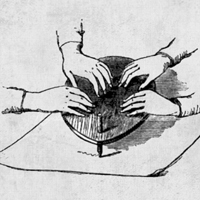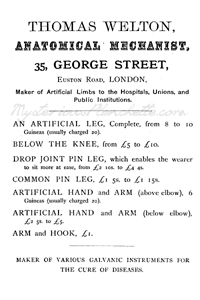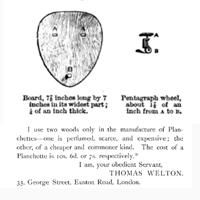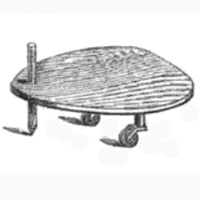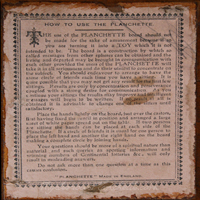Thomas Welton is one of the more fascinating names connected to planchettes, and one of the early innovators and manufacturers of the devices. Welton was an ardent follower of Spiritualism and an enthusiastic author and theorist in the movement. Welton was a London-based artificial limb and surgical instrument maker by trade, and his wife a well-known crystal gazer and seer. He was an avid letter-writer to various Spiritualist publications, wading into the theoretical frays and arguments over all manner of esoteric subject, never afraid to stake his claim and hold his own.
At various times, Welton alternatively confirmed Kardec's 1853 history of the French invention of the planchette, or claimed to be the inventor himself-often expressing with unsettled resignation that American planchette manufacturers had "stolen a march" on him by copying his invention, even while confirming at other times their French origin. He is also the source of a contradictory account of Robert Dale Owen's importation of the planchette to the States, but as with so many of Welton's claims, we can't always be sure of his intentions, or whether he was just a vested interest staking his claim in the world of spirit communication tools.
Welton oftentimes dismissed the planchette are just another in a long line of "vitomagnetic" machines that he claimed to have been producing, assigning it as another step in the evolutionary chain of such devices beginning with Rutter's Magnetocope and the experiments begun with it. He was a huge proponent of proper materials and construction, claiming that "laburnum, oak, ash, and many other woods will not serve," and condemning rival manufacturer's planks and their use of improper woods as the reason their planchettes didn't always work. He claimed propriety on the woods he did use, advertising only that "one is perfumed, scarce, and expensive; the other, of a cheaper and commoner kind."
Welton claimed that for all his enthusiasm, planchettes did not work for him. Instead, he was an armchair theorist, and while he gives credence to his wife's mediumistic powers, also admits that the planchette's power could derive from any number of esoteric forces prescribed by "scientists" of his day, including spiritual, mesmeric, Reichenbach's Odic force, or vitomagnetic. He produced several books on the subject, including an as-of-yet rediscovered pamphlet entitled "Planchette," as well as the books Jacob's Rob and Mental Magic.
We can take a good guess as to what Welton's planchettes may have looked like, and in fact may hold one of his items in our collection. If the published 1867 drawings of a British instrument in the "Once a Week" periodical are properly attributed to one of his instruments, and not an American planchette as is claimed, then we can indeed credit him for the classic British form of round nosed, flat backed planchettes. Indeed, the detailed drawing even seems to show nearly identical shape and castors to early Jaques & Sons models, and it is likely that Welton soon found that his early fears of American counterfeiting paled in comparison to the industrial juggernaut of the British toy industry once the boards established a firm foothold of demand in the popular consciousness of her majesty's loyal subjects. By late 1867, however, he was still 'king of planks' in England, rivaled only by Elliot Bros, the scientific instrument makers to whom the author of the "Once a Week" article gave his supposedly-American plank to copy.
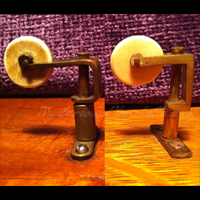
Castor comparison between possible Welton plank and Jaques & Son from same period. Note difference in axle retainers.
Our tentative attribution of the Welton planchette is due primarily to the wooden box's label. Not only were toy and game manufacturers unlikely to use wooden boxes for a device of this type in this era, but the language of the label is bitter and even antagonistic toward the device being treated as a toy. In fact, the instructions explicit state that with the planchette, "messages from other spheres can be obtained and the living and departed may be brought in communication with each other." Toy companies, on the other hand, tended to stay very coy regarding the instruments' use as a spirit communication tool. The verbosity of the instructions match perfectly with the language and demeanor of Thomas Welton's existing writings, and for these reasons we tentatively attribute this planchette to him. At the very least, the item is of British cottage industry construction, and a fine specimen at that!
By 1884, Welton was still an active proponent of various theories of animal magnetism, dowsing, and other esoteric subjects. That year, he published materials on the subjects in his book Mental Magic. While still an artificial limb manufacturer by trade at that time, he seems to have given up on planchettes, no doubt overrun by the commercialization of British toy firms. His ads at the back of his final book promote his day trade, but make no mention of the famous objects that bring him here to us.







